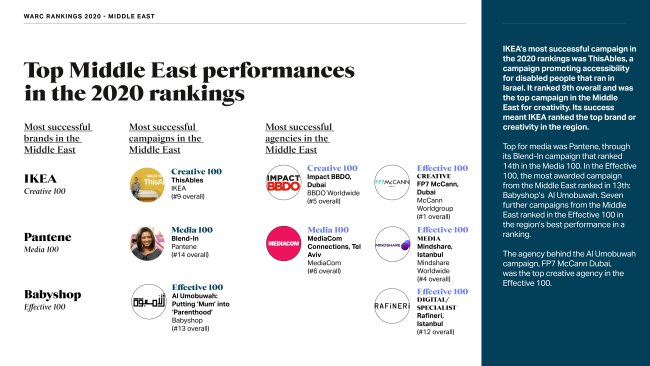 Insights behind the winning work from the WARC Rankings
Insights behind the winning work from the WARC Rankings
WARC, the international marketing information company, has today released Lessons from the World’s Most Awarded Brands, a report based on an analysis of the recently released three WARC Rankings – Creative 100, Media 100, Effective 100.
The study looks at the strategies and approaches of some of the brands placed highly in the 2020 WARC Rankings, an independent benchmark of the world’s most awarded campaigns and companies based on their performance at the industry’s most important global and regional award shows of 2019.
David Tiltman, VP Content, WARC, says: “To learn from the best, we’ve interviewed the teams behind some of the highly ranked work to see how it came about, and what they learned from it. At a time when marketing budgets are coming under pressure as the threat of recession looms, these are some of the ways marketers can make sure their brands stay relevant.”
WARC has found nine common marketing themes used by highly successful brands:
1. They are marketers, not just communicators
While a lot of the work featured in the rankings is communications, the stories behind that work reveal marketers working across the classic 4Ps spectrum – product, price, place, and promotion.
IKEA identified a product opportunity to appeal to a new audience and ensured distribution through 3D printing. NRMA Insurance took marketing communications budget and effectively reinvested it in cashback to its customers via its Safety Hub. There is also a growing interest in the breadth of the customer experience, and how to align all interactions with a brand – McDonald’s talks about “feelgood moments” that span ads to packaging to design.
2. They know how they’re contributing
A consistent theme through the interviews in the report is that marketers know how their work contributes at a business level. Meaning brand metrics are joined up to commercial objectives. For retailers that link might be very direct – as Colin Mitchell, CMO of McDonald’s points out, they receive sales data very quickly and can see what is working. For others it requires more work. Samsung and its agency Starcom, use search data as a leading indicator of business impact.
3. They have one eye on the long term
Long-term marketing investment versus short-term is a very live debate at present. This might involve splitting budgets between distinct ‘brand’ and ‘activation’ work. It also involves the nurturing of ‘distinctive brand assets’ over time, which demands consistency as well as creativity.
Volkswagen balances brand investment like the ‘Road Tales’ project with very sales-focused work. Meanwhile, Fernando Machado, CMO of Burger King is criticised by some for a ‘stunt’ approach. But as he points out in the report, that is only one element of his marketing plan as he balances high-impact brand activity with everyday executions designed to drive footfall.

4. They know creativity is key – but only when applied in a business context
Creativity is a key element as brands seek distinctive and innovative products and communications. Whilst creativity drives distinctiveness, and in some cases delivers a cultural impact, it means nothing if it isn’t achieving broader commercial objectives.
An example is Burger King’s Whopper Detour: fantastically creative, but with a real business purpose underlying it – to drive downloads and orders through an app.
5. They tolerate risk
The decision to do something different – for example, to run a campaign that does not play by category rules, or to divert budget into an untested proposition – can seem risky. But the rewards are potentially much higher. The marketers in this report understand that trade-off. Indeed, some of the brands in the report – even big ones like Samsung and Burger King – take a ‘challenger’ approach. They deliberately flout category rules and use attention grabbing tactics that court controversy to position themselves against a bigger competitor.
6. They execute flawlessly – even if it takes time
The scale of some of the work in the WARC Rankings is breathtaking. ‘Whopper Detour’ took a year to come to market due to the technical and legal complexities. Carrefour’s ‘Black Supermarket’ also took a year as the marketing team convinced colleagues, lawyers and lobbyists it should deliberately flout the law to gain an advantage. IKEA’s ThisAbles project took even longer. A genuinely great idea is worth the wait if that’s what it takes to land it seamlessly.
7. Their purpose is focused
Purpose has become synonymous with ‘save the world’ communications that have little alignment with a brand’s actual objectives or its impact in the world. In this report, a lot of the marketers use the word ‘purpose’ – but that purpose is usually focused on their customers and their pain points. In other words, they know why their brand exists and how it ought to behave.
IKEA’s approach to developing add-ons for the disabled community is a textbook example of spotting a new way to serve a specific group, and Volkswagen’s ‘Road Tales’ was built on the simple need to entertain children during a car journey.
8. They look for the human stories in data
While a lot of modern marketing revolves around data-driven ideas and tech innovation, successful brands have the ability to spot human stories or ‘small data’ and turn that information into a source of creativity and competitive advantage.
Much of the success of KFC’s work in China is built around Chinese gaming and e-sports. This in turn was built on the observation that KFC’s meals can be eaten with one hand, leaving the other hand free to hold a controller. Volvo’s EVA initiative was all about data; but what made it powerful was the message that crash test data had become a gender issue.
9. They build an ecosystem of trusted partners
Most marketers work with external partners, but much of the work in this report springs from relationships that go beyond supplier and contractor. Some projects involve broader ecosystems, as clients and agencies bring in specialist support. A common thread: it’s not just about hiring the right people – it’s about sharing data, giving them access across the organisation, and setting them briefs that will bring out the best from them.
Joe Stubbs, Vice President of Global Brand, Interbrand, who provides expert commentary in the report, comments: “Becoming a successful brand is not as easy as having great products and services. Becoming a successful brand is about having the courage to continuously make bold and iconic moves that will drive exceptional results.”


